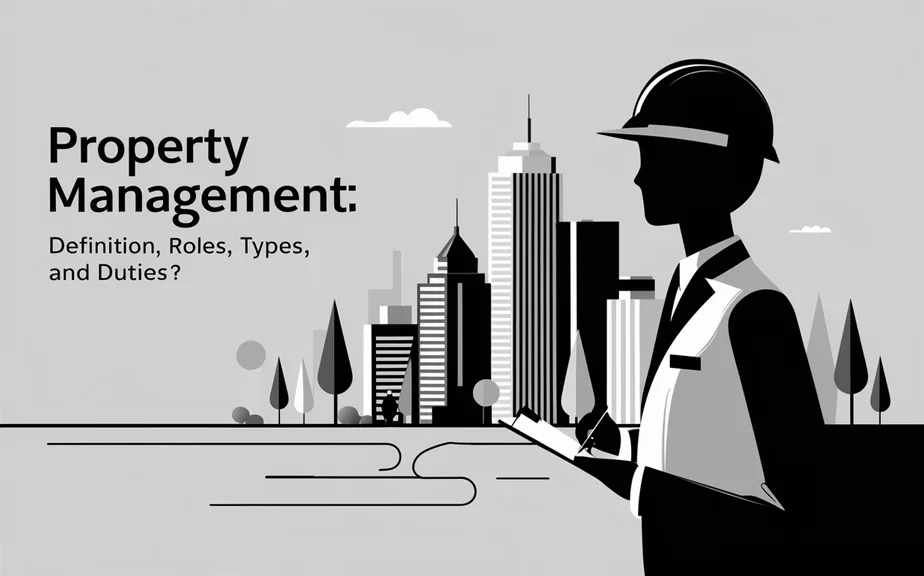What Is Property Management?
Property management involves the daily oversight of residential, commercial, or industrial real estate by a third-party contractor. These property managers handle various tasks to maintain and enhance the property’s value while generating income for the owners. This article dives into the world of property management, explaining its definition, roles, types, and duties in an easy-to-understand manner.

Understanding Property Management
Property management is the administration of real estate properties by a third-party company. Property managers are hired by property owners to manage the routine operations and maintenance of their investment properties. These properties can include apartment complexes, private home communities, shopping centers, and industrial parks. The primary goal of property management is to preserve and increase the value of the property while ensuring it generates income.
Key Takeaways
- Property management involves overseeing real estate by a third party.
- Property managers handle residential, commercial, industrial, and special-purpose properties.
- Responsibilities include tenant screening, rent collection, property maintenance, and more.
- Compensation for property managers is typically a fee or a percentage of the rent.
- State laws regulate property management activities.
Roles and Responsibilities of Property Managers
Property managers take on a wide range of responsibilities to ensure the smooth operation of properties. Here are some of their key duties:
Tenant Management
- Screening Potential Tenants: Property managers assess potential tenants to ensure they are reliable and capable of paying rent on time.
- Drafting and Signing Leases: They prepare lease agreements and handle the signing and renewal processes.
- Collecting Rent: Ensuring timely rent collection and addressing any payment issues is a crucial part of their role.
- Handling Tenant Complaints: Property managers address tenant concerns and resolve any disputes that may arise.
Property Maintenance
- Routine Maintenance: This includes regular upkeep such as landscaping, snow removal, and general repairs.
- Emergency Repairs: Property managers arrange for urgent repairs to address issues that could affect tenant safety or property value.
- Property Inspections: Regular inspections help identify and resolve maintenance issues before they become significant problems.
Financial Management
- Budgeting: Setting and adhering to budgets for property maintenance and operations.
- Financial Reporting: Providing property owners with detailed reports on income and expenses.
- Tax Compliance: Ensuring compliance with state and national tax regulations related to property management.
Legal Responsibilities
- Landlord-Tenant Laws: Property managers must be knowledgeable about state and national laws governing landlord-tenant relationships.
- Evictions: Handling eviction processes in compliance with legal requirements.
Types of Property Management
Property management services vary based on the type of property being managed. Here are the main types of property management:
Residential Property Management
Residential property managers focus on rental properties such as:
- Single-Family Homes: Managing individual rental homes.
- Vacation Rentals: Overseeing short-term rental properties.
- Multifamily Homes: Handling apartment buildings and townhouses.
- Condominiums and Apartments: Managing complex communities and ensuring tenant satisfaction.
- Manufactured Homes: Overseeing mobile home parks.
- Real Estate-Owned (REO) Properties: Managing properties owned by banks.
Commercial Property Management
Commercial property management caters to the needs of business properties, including:
- Public Accommodations: Managing hotels and motels.
- Retail Properties: Overseeing malls, restaurants, and gas stations.
- Office Properties: Managing office buildings for businesses like real estate brokerages and medical offices.
- Co-Working Spaces: Handling shared workspaces rented by professionals.
Industrial Property Management
Industrial property managers oversee properties such as:
- Heavy Manufacturing: Managing large factories like automotive plants.
- Light Manufacturing: Handling smaller manufacturing facilities, such as food packaging plants.
- Warehouses: Overseeing storage facilities.
- Distribution Facilities: Managing logistics and distribution centers.
Special-Purpose Property Management
Special-purpose properties require specialized management, including:
- Theaters: Managing performance venues.
- Sports Arenas: Overseeing large sports complexes.
- Resorts: Handling vacation resorts and amenities.
- Senior Care Facilities: Managing assisted living and nursing homes.
- Schools and Universities: Overseeing educational institution properties.
- Places of Worship: Managing churches, temples, and other religious buildings.
Who Needs a Property Manager?
Several types of property owners can benefit from hiring property managers:
Landlords
Landlords with multiple rental properties often lack the time or expertise to manage their properties effectively. Property managers handle tenant relations, maintenance, and financial reporting, allowing landlords to focus on growing their investment portfolios.
Absentee Landlords
Property owners who live far from their rental properties or have other commitments benefit from hiring property managers to oversee daily operations and ensure the property’s upkeep.
Affordable Housing Owners
Owners of affordable housing properties often use property management services due to the complex federal guidelines involved. Property managers ensure compliance with these regulations while managing tenant relations and property maintenance.
Real Estate Brokers
Some real estate brokers offer property management services alongside their traditional buying and selling services. This is common in resort towns where brokers manage vacation rentals for property owners.
Special Considerations in Property Management
Property management licensing requirements vary by state. Most states require property management companies to be licensed by the local real estate board. It’s essential for property owners to ensure the firms they hire are properly licensed.
Licensing Requirements
For example, property managers in Florida must have real estate broker licenses to operate. This allows them to list rental properties in the multiple listing service (MLS) and market them using standard real estate methods. Managers who own the properties they manage do not need a license.
In Massachusetts, property managers do not require a broker’s license, as certain duties considered real estate activities may be secondary to their main responsibilities.
Is Hiring a Property Manager Worth It?
Deciding whether to hire a property manager depends on various factors. Managing properties can be time-consuming and costly. If the cost of hiring a property manager is less than the opportunity cost of managing the properties yourself, it is likely a good investment. Each property owner must evaluate their situation to determine the best course of action.
Conclusion
Property management is a critical service for property owners who want to maintain and enhance the value of their investments without the hassle of day-to-day operations. Whether dealing with residential, commercial, industrial, or special-purpose properties, property managers play a vital role in ensuring properties are well-maintained, compliant with regulations, and profitable. By understanding the roles, types, and responsibilities of property management, property owners can make informed decisions about whether hiring a property manager is the right choice for them.

Roger Varley is a seasoned financial expert with over two decades of experience and an MBA from Harvard Business School. He specializes in commodity trading and portfolio diversification, and has authored several bestsellers that simplify complex financial concepts for investors. Residing in New York City, Roger continues to share his knowledge through his writing and lectures at financial conferences worldwide.



